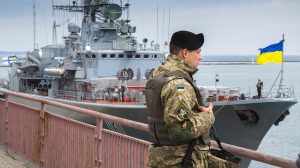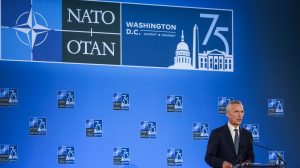You can read all of our coverage of Russia’s invasion of Ukraine, including explainers and articles offering context and background information here.
Russia’s invasion of Ukraine
Russia this week accused Ukraine of hitting the Kerch Strait Bridge, saying that two maritime drones had struck the bridge, an essential supply line for Russian troops.
Predawn explosions hit the only bridge linking the occupied Crimean Peninsula to Russia on Monday, damaging a vital symbol of President Vladimir Putin’s claims to sovereignty over Ukrainian territory.
The blasts were the second time the Kerch Strait Bridge has been hit in 10 months. And though these inflicted far less damage than an explosives-laden truck that blew up last October, they exposed the vulnerability of the bridge — and other Russian supply routes far from the front — as Ukraine wages a grueling counteroffensive to retake land.
Ukrainian officials celebrated the attack, but neither claimed nor denied responsibility for the blasts.
After the bridge attack, Russia said it was ending its participation in an agreement that had allowed Ukraine to export its grain by sea despite Moscow’s naval blockade, upending a deal that had helped to keep global food prices stable and alleviate one element of the global fallout from the war.
Ukraine is a major producer of grain and other foodstuffs, and the United Nations secretary general, António Guterres, said he was “deeply disappointed” by the decision. Millions of people who face hunger, or are struggling, as well as consumers around the world facing a cost of living crisis, will “pay a price,” he said.
“This decision by the Russian Federation will strike a blow to people in need everywhere,” he said.
Following its withdrawal from the grain deal, Moscow ramped up its threats to Ukraine’s Black Sea ports and the ships that dock there, heightening the risk of conflict in the key trade route and sending global wheat prices sharply upward.
Russia’s defense ministry warned in a statement on Wednesday that “all vessels sailing in the waters of the Black Sea to Ukrainian ports will be regarded as potential carriers of military cargo.” The statement added that “the countries of such vessels will be considered to be involved in the Ukrainian conflict on the side of the Kyiv regime.”
The United States said it believes Russia has placed more sea mines around Ukrainian ports and could attack commercial ships in the region. Russia has also struck ports with missile and drone strikes—including Odesa, where the Chinese consulate building was damaged.
Saying that Moscow was deliberately turning the Black Sea into a “danger zone”, Kyiv responded in kind by saying that from Friday they would treat ships heading for Russian ports – or Russian-occupied ports in Ukraine – would be treated the same way, as if they are carrying weapons or other military cargo.
Ryanair’s boss Michael O’Leary visited Kyiv on Thursday and said that he hopes to reconnect the country’s Lviv and Odesa airports with more than 20 European Union capital cities within eight weeks of the reopening of air space with around 600 weekly flights.
“The fastest way to rebuild and restore the Ukrainian economy will be with low-fare air travel,” the chief executive said. “Ryanair intends to invest heavily in Ukraine and lead this aviation recovery by investing up to three billion US dollars and basing up to 30 Boeing Max aircraft at Ukraine’s three main airports in Kyiv, Lviv and Odesa.”
“Having previously also served Kharkiv and Kherson airports prior to the invasion, Ryanair will return to serving those airports too, as soon as the infrastructure has been restored,” he added.
The company plans to employ hundreds of Ukrainian pilots, cabin crew, and IT professionals and will look to create thousands of new jobs in aviation for Ukrainian citizens.

Other news from the region
The Polish government this week submitted four complaints against EU climate policies, calling them “authoritarian” and pledging that it “will not allow Brussels’ diktat”. Three new cases filed to the Court of Justice of the European Union (CJEU) relate to a ban on the registration of new internal combustion vehicles after 2035, an increase in the EU’s greenhouse gas reduction target, and a reduction of free emission allowances under the EU Emissions Trading System (ETS).
Moldova appointed a new interior minister on Monday following the resignation of his predecessor after a deadly shootout at the country’s main international airport. A government spokesman said the new minister, Colonel Adrian Efros, had been working at the ministry prior to his appointment and was sworn in with two other new ministers at President Maia Sandu’s residence. Efros, Science and Education Minister Dan Perciun and Infrastructure and Regional Development Minister Andrei Spinu all replaced ministers who quit last Friday.
Tourism officials in Albania are expecting up to ten million tourists this year as visitors choose its stunning beaches and low costs. The trend has been evident since early spring and tour operators expect visitors to arrive in increasing numbers. Head of the Association of Tour Operators in Saranda, Arben Cipa, has noticed a considerable increase, as well as variety in visitors, saying this week, “I think this year we might possibly reach even 200 per cent [of the clientele] compared to last year.”
Turkey’s decision to supply Kosovo with drones has sparked fury in Serbia which has called it “unacceptable”. Last weekend Kosovo’s Prime Minister Albin Kurti proudly showcased the country’s latest purchase of Bayraktar TB2 drones, a model most recently used in Ukraine against Russian targets to great effect. Angered by the sale of drones to Kosovo, Serbian President Aleksandar Vučić said last month that his country had cancelled planned drone purchases from Turkey.
Proposals to send humanitarian aid to Nagorno-Karabakh from Azerbaijani-controlled land appear to have been backed by the EU, causing outrage in Armenia. Supplies to the region have repeatedly been cut off since the blockade of the Lachin Corridor began in December, with the situation again deteriorating since mid-June. As the region grappled with food and energy shortages under blockade, Baku has proposed sending humanitarian aid and supplies to Nagorno-Karabakh through Aghdam. On July 15, EU Council President Charles Michel appeared to back proposals by Azerbaijan.
An international medical mission to examine imprisoned former president Mikheil Saakashvili of Georgia has become bogged down in controversy after video emerged depicting one of the doctors — the government claims — trying to sneak out medical samples from the ex-leader. The product of months of negotiations, the Polish mission was supposed to provide an independent assessment of Saakashvili’s health and treatment while being incarcerated after more than a year of bitter mutual accusations between the government and the former president’s team.
Bulgaria’s ruling coalition parties have proposed ending a concession controlling the Black Sea oil port of Burgas, through which Lukoil brings Russian oil via tankers to be processed, hoping this will help Bulgaria secure Schengen membership as early as autumn. Rosenets Port is the only specialised oil port on the Bulgarian Black Sea coast and has been under the full control of the Russian company since 2011.
President Zoran Milanović of Croatia has used a never previously invoked power to convene a session of parliament, drawing government accusations that it is part of a ‘deal’ with the opposition. Milanović on Wednesday submitted a request for an extraordinary session on the functioning of the judiciary due to the strike that has lasted for seven weeks and on the responsibility for financial damage related to the sale of Croatian Electricity Company (HEP) gas. Milanovic acted after nine opposition parliamentary groups, including his own Social Democrats, sent him a formal proposal to request an extraordinary session.
Unlike many news and information platforms, Emerging Europe is free to read, and always will be. There is no paywall here. We are independent, not affiliated with nor representing any political party or business organisation. We want the very best for emerging Europe, nothing more, nothing less. Your support will help us continue to spread the word about this amazing region.
You can contribute here. Thank you.







Add Comment